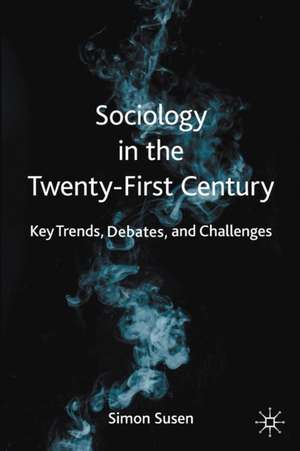Sociology in the Twenty-First Century: Key Trends, Debates, and Challenges
Autor Simon Susenen Limba Engleză Paperback – 18 oct 2020
These issues have been, and will continue to be, essential to the creation of conceptually informed, methodologically rigorous, and empirically substantiated research programmes in the discipline. Over the past years, however, there have been numerous disputes and controversies concerning the future of sociology. Particularly important in this respect are recent and ongoing discussions on the possibilities of developing new – and, arguably, post-classical – forms of sociology. The central assumption underlying most of these projects is the contention that a comprehensive analysis of the principal challenges faced by global society requires the construction of a sociology capable of accounting for the interconnectedness of social actors and social structures across time and space.
This book provides a cutting-edge overview of crucial past, present, and possible future trends, debates, and challenges shaping the pursuit of sociological inquiry.
‘Simon Susen – one of the most knowledgeable scholars in the contemporary social sciences – examines the key challenges with which sociology is confronted today. This book is a must-read for professional sociologists as well as for those studying the subject.’ – Luc Boltanski, École des Hautes Études en Sciences Sociales, Paris, France
‘Simon Susen provides a balanced update on sociology’s theoretical, methodological, and institutional resources as well as challenges in today’s complicated local and global social worlds. Fortunately, he has innovative and practical recommendations for ensuring the cutting-edge relevance of sociological thinking. This book is an excellent choice for undergraduate and postgraduate students as well as for the general reader.’ – Sandra Harding, University of California, Los Angeles, USA
‘A comprehensive and judicious account of the intellectual and material state of sociology, based on omnivorous reading and incisive analysis. The writing is beautifully clear, and the bookis a major contribution to the self-understanding of the discipline.’ – William Outhwaite, Newcastle University, UK
Preț: 474.95 lei
Nou
Puncte Express: 712
Preț estimativ în valută:
90.90€ • 93.68$ • 76.75£
90.90€ • 93.68$ • 76.75£
Carte tipărită la comandă
Livrare economică 01-15 martie
Preluare comenzi: 021 569.72.76
Specificații
ISBN-13: 9783030384234
ISBN-10: 3030384233
Pagini: 552
Ilustrații: XXIII, 623 p.
Dimensiuni: 155 x 235 x 42 mm
Greutate: 0.9 kg
Ediția:1st ed. 2020
Editura: Springer International Publishing
Colecția Palgrave Macmillan
Locul publicării:Cham, Switzerland
ISBN-10: 3030384233
Pagini: 552
Ilustrații: XXIII, 623 p.
Dimensiuni: 155 x 235 x 42 mm
Greutate: 0.9 kg
Ediția:1st ed. 2020
Editura: Springer International Publishing
Colecția Palgrave Macmillan
Locul publicării:Cham, Switzerland
Cuprins
Introduction.- Part I: Intimations of Postcoloniality.- Chapter 1: Postcoloniality and Sociology.- Chapter 2: Postcoloniality and Decoloniality.- Part II: Intimations of Globality.- Chapter 3: Globality and Sociology.- Chapter 4: Globality and Connectivity.- Part III: Intimations of Canonicity.- Chapter 5: Canonicity and Sociology.- Chapter 6: Canonicity and Exclusivity.- Part IV: Intimations of Historicity.- Chapter 7: Historicity and Sociology.- Chapter 8: Historicity and Novelty.- Part V: Intimations of Disciplinarity.- Chapter 9: Disciplinarity and Sociology.- Chapter 10: Disciplinarity and Interdisciplinarity.- Part VI: Intimations of Hegemony.- Chapter 11: Hegemony and Sociology.- Chapter 12: Hegemony and Counterhegemony.- Part VII: Intimations of Reflexivity.- Epilogue: Critical Remarks.- Conclusion.
Notă biografică
Simon Susen is Professor of Sociology at City, University of London. He is Associate Member of the Bauman Institute and Co-Editor of the Journal of Classical Sociology.
Textul de pe ultima copertă
“A comprehensive and judicious account of the intellectual and material state of sociology, based on omnivorous reading and incisive analysis. The writing is beautifully clear and the book is a major contribution to the self-understanding of the discipline.” — William Outhwaite, Professor of Sociology at Newcastle University, UK
These issues have been, and will continue to be, essential to the creation of conceptually informed, methodologically rigorous, and empirically substantiated research programmes in the discipline. Over the past years, however, there have been numerous disputes and controversies concerning the future of sociology. Particularly important in this respect are recent and ongoing discussions on the possibilities of developing new – and, arguably, post-classical – forms of sociology. The central assumption underlying most of these projects is the contention that a comprehensive analysis of the principal challenges faced by global society requires the construction of a sociology capable of accounting for the interconnectedness of social actors and social structures across time and space.
This book provides a cutting-edge overview of crucial past, present, and possible future trends, debates, and challenges shaping the pursuit of sociological inquiry.
Caracteristici
Offers much needed pedagogical guidance on social theory for sociology students Demonstrates that the development of both classical and contemporary social theory is an intellectually exciting area of investigation Contextualises, explains and assesses influential sociological ideas and approaches, focusing on six main themes: ‘postcoloniality’, ‘globality’, ‘canonicity’, ‘historicity’, ‘disciplinarity’, and ‘hegemony’
